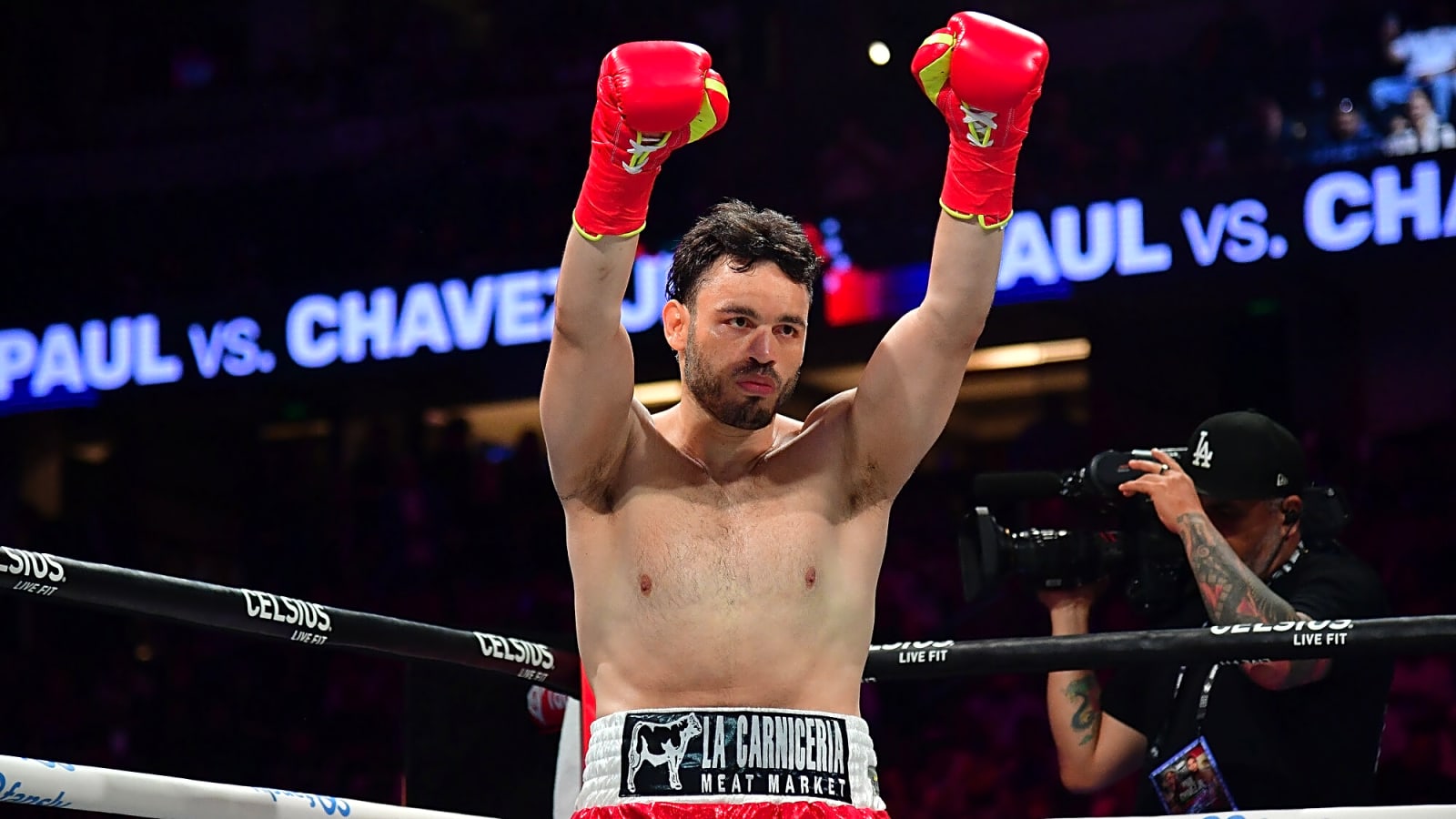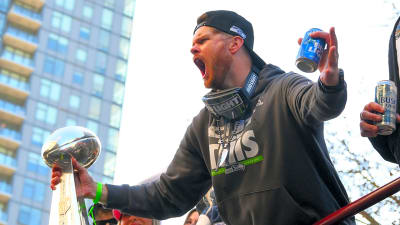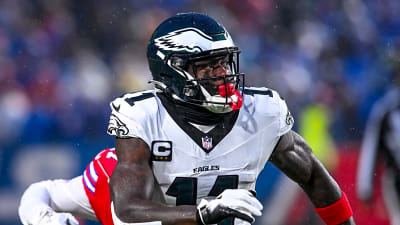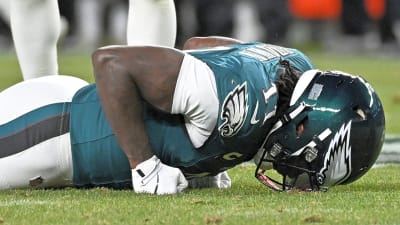
The boxing world is reeling today from an announcement from the U.S. Department of Homeland Security (DHS) announcing that Immigration and Customs Enforcement (ICE) has detained Julio César Chávez Jr.. ICE took Chávez Jr. into custody in front of his Studio City, California home. Chávez Jr., age 39, is a Mexican citizen considered a “criminal illegal alien” by DHS and is believed to be affiliated with the Sinaloa Cartel.
News of the arrest has been reported by major media around the world, from CNN to the BBC to the New York Times, from Fox News to People Magazine.
The arrest comes just days after the former middleweight champion and son of Mexican boxing legend Julio Cesar Chávez Jr., lost in the main event of a Most Valuable Promotions card in Anaheim, California, against Jake Paul.
Fox 11 Los Angeles reporter Matthew Seedorff secured bodycam footage of the arrest and posted it to his X/Twitter account. In the video, Chávez Jr. complies with officers and does not resist, asking only why agents didn’t inform his lawyer, Michael Goldstein, about the existence of the warrant.
NEW; Through federal sources, I have obtained video of ICE arresting Mexican boxer Julio Cesar Chavez Jr. Wednesday in Studio City, CA. The boxer is accused of being affiliated with the Sinaloa Cartel. pic.twitter.com/FpD0v4aTta
— Matthew Seedorff (@MattSeedorff) July 3, 2025
It seems a rather handy coincidence there was clear body cam footage available to splash in media outlets around the world within moments. But if it doesn’t make for good content, what’s the point?Right?
Chávez Jr. Arrested In Front Of His Home
Goldstein later told the Associated Press that federal agents arrested Chávez Jr. while he was out riding a scooter in front of his home.
“The current allegations are outrageous and simply another headline to terrorize the community,” said Goldstein. “The current allegations are outrageous and simply another headline to terrorize the community.” Goldstein said he does not know where his client is being detained.
Chávez Jr. and Goldstein were already scheduled to appear in court in Los Angeles on Monday in connection with a 2024 gun possession charge, and to provide an update on court-ordered participation in a substance abuse program. Chávez Jr., who has been no stranger to drug and alcohol addiction struggles, has reportedly been clean for more than a year and a half since the original arrest.
Chávez Jr.’s Legal Troubles Go Way Back
According to DHS, Chávez Jr. reportedly has an active arrest warrant in Mexico for organized crime and trafficking in firearms, ammunition, and explosives. The Mexican Attorney General’s Office confirmed Thursday that U.S. authorities have initiated proceedings to hand him over to Mexican officials. is moving forward with his expedited removal from the United States
“This Sinaloa Cartel affiliate with an active arrest warrant for trafficking guns, ammunition and explosives was arrested by ICE,” said Department of Homeland Security Assistant Secretary for Public Affairs Tricia McLaughlin. “It is shocking the previous administration flagged this criminal illegal alien as a public safety threat, but chose to not prioritize his removal and let him leave and COME BACK into our country.
“Under President Trump, no one is above the law – including world-famous athletes. Our message to any cartel affiliates in the U.S. is clear: We will find you and you will face consequences. The days of unchecked cartel violence are over.”
Mexico’s Attorney General’s office reported to Associated Press it has initiated extradition procedures for Chávez Jr.
Chávez Jr. Boxing Career Affected By Out of the Ring Behavior
Outside of boxing, Chávez Jr. has a troubled personal history which has repeatedly stalled his professional boxing career, fueled primarily by his addiction. His three prior arrests and convictions have been relatively minor and non-violent, including a 2021 DUI conviction in California, serving jail time, and the January 2024 conviction for illegally possessing so-called “ghost guns,” AR-style assault weapons and manufacturing or importing a short-barreled rifle.
Chávez Jr. has for many years split his time between the U.S. in Southern California, and in Mexico. Most recently, he entered the U.S. in August 2023 on a B2 tourist visa. It expired in February 2024. He applied for lawful permanent resident status, more commonly known as a “green card,” in April 2024.
Chávez Jr. is married to an American citizen named Frida Muñoz. She was previously married to a now-deceased son of the notorious Sinaloa Cartel kingpin Joaquin “El Chapo” Guzman, now in prison reportedly at a maximum security facility in Colorado.
Muñoz has a daughter from that marriage, who is Chávez Jr.’s stepdaughter. DHS says Chávez Jr. himself is believed to be affiliated with the Sinaloa Cartel, which has been designated as a Foreign Terrorist Organization (FTO) by the Trump Administration.
DHS claims Chávez Jr. made “multiple fraudulent statements” on his application. when he applied for permanent residency, and that U.S. Citizenship and Immigration Services “made a referral to ICE that Chavez is an egregious public safety threat” in December under the Biden Administration but the boxer “was not an immigration enforcement priority.”
On January 4, Chávez Jr. entered the U.S. at the San Ysidro, California (San Diego) port of entry.
Legal Issues Swirling around Paul vs Chávez Jr. Fight
With probable cause that Chávez Jr. was in the U.S. illegally, ICE declared him removable on June 27. Check your calendar. June 27 is just one day prior to Chávez Jr.’s fight with Jake Paul, and the day of the weigh-in.
With all this swirling, Chávez Jr. (54-7-1, 34 KOs) was training for his bout with Paul (12-1, 7 KOs) at the Honda Center last Saturday, losing by a ten-round unanimous decision. He had participated in multiple interviews, public workouts and appearances. During fight week, Chávez Jr. and Paul made appearances open to the public at a Wednesday night news conference, a Thursday public workout event, and Friday’s public weigh-in, all heavily attended by fans.
Also on hand for the Friday was Chávez Jr.’s famous father and a revered figure in Mexico, Julio Cesar Chávez Sr. Several hours after Chávez Jr. was taken into custody, Chávez Sr. posted a letter in Spanish on behalf of the entire family. The English translation:
“To all media:
Given recent events and the statements issued by American authorities, the Chavez family expresses the following:
Our family is profoundly dismayed by the current situation. In these difficult times, we reiterate our total and unconditional support for Julio.
We fully trust in his human qualities, as well as in the justice institutions of both Mexico and the United States, in whom we place our hope that the situation will be clarified according to law and truth.
Julio is above all a son, a father, and a human being who has faced multiple challenges in his personal and professional life. As a family, we respectfully ask that due process be guaranteed and that prejudgments that violate his dignity and that of those around him be avoided.
We sincerely appreciate the media’s interest and coverage, but we appeal to your sensitivity and understanding to respect our decision not to speak further at this time. We firmly believe that the appropriate path is to allow the competent authorities to carry out their work without external pressure or speculation.
We pray for a prompt resolution that clarifies the facts in Julio’s favor, and we reiterate our call for prudence and objectivity in this regard.”
Why Did ICE Wait Until After The Paul vs Chávez Jr. Fight?
It’s the million-dollar question, quite literally. Chávez Jr. earned a purse of $750,000 for the Paul fight, and likely a cut of the pay-per-view revenue, which has not been reported. Why did ICE wait to act?
If immigration officials truly believed Chávez Jr. was “an egregious public safety threat,” why was he not arrested several months ago after the Trump administration took office? There has also reportedly been an arrest warrant in Mexico for Chávez Jr. since March 2023 in connection with an organized crime and gun trafficking investigation. Since then, Chávez Jr. has traveled between the two countries multiple times.
But news reports today, both in the mainstream media and among boxing journalists, are putting the circumstances of Chávez Jr.’s arrest front and center. He is certainly the most well-known public figure arrested under the current administration’s quest to deport all illegal immigrants in the U.S.
Before the fight, Chávez Jr. was quoted in the Los Angeles Times in the lead-up to the Jake Paul fight about the immigration arrests. It’s been a topic almost impossible to avoid anywhere in Southern California from Los Angeles to the Mexican border. He acknowledged he and his trainers were shaken up, to the point one of his trainers did not accompany him to the U.S.
“There are a lot of good people, and you’re giving the community an example of violence,” said Chávez Jr. “After everything that’s happened, I wouldn’t want to be deported.”
Immigration Law Affecting Boxing In The U.S.
Famous athletes are not above the law. If Mexican prosecutors have legitimate probable cause to pursue a criminal case against Chávez Jr., so be it.
Yes, it is considered a federal crime in the U.S. to lie on a green card application. It’s immigration fraud, and a conviction can result in fines, incarceration, and deportation from the U.S. Defendants risk being permanently barred from the U.S. Palestinian protester Mahmoud Khalil, a student at Columbia University, was accused of similar immigration fraud. He remains in custody fighting deportation.
Given the international nature of boxing, and particularly the prevalence in the United States of Mexican, Central, and South American-born boxers who train and compete in American gyms and venues from Los Angeles to Las Vegas to New York, it surely casts a shadow on the sport.
Let’s be real here. Unlike Chávez Jr., most boxers do not come from affluent backgrounds. Maybe they’ve played a little loose with their street behavior, and they’ve got friends who aren’t too savory. They don’t have the best attorneys on retainer, and they don’t have family members considered social royalty in their home nations.
It isn’t uncommon for athletes with a big fight coming up to struggle getting a visa. Just this week, Imam Khataev of Russia secured his visa to face Hamzah Sheeraz of England in New York on July 12. The late approval put the much-anticipated fight in jeopardy.
Will fluctuating immigration rules and travel restrictions throw another legal wrench in front of boxing? There are already concerns about immigration snafus related to the 2026 World Cup and the 2028 Los Angeles Olympic Games. The current administration has attempted to impose a travel ban from Muslim nations and other countries, such as Haiti, which it considers troubled.
Trump Administration officials say there are exemptions for athletes. But a relatively unknown boxer from a country whose citizens are completely barred, like the Congo, Haiti, or Somalia, or who are subject to serious visa restrictions, such as Cuba or Venezuela, could have a serious impact in the U.S.
It won’t be surprising if promoters shift their fight cards to places outside the United States to avoid the drama and the headaches of working with shifting political sands under their feet. The losers, as usual, are the American fans.
More must-reads:
- Why Cardinals' decision to retain DC Nick Rallis is a recipe for another losing season
- Astros, Blue Jays swap Jesus Sanchez, Joey Loperfido in win-win trade
- The 'Super Bowl winning coaches' quiz
Breaking News
Trending News
Customize Your Newsletter
 +
+
Get the latest news and rumors, customized to your favorite sports and teams. Emailed daily. Always free!








